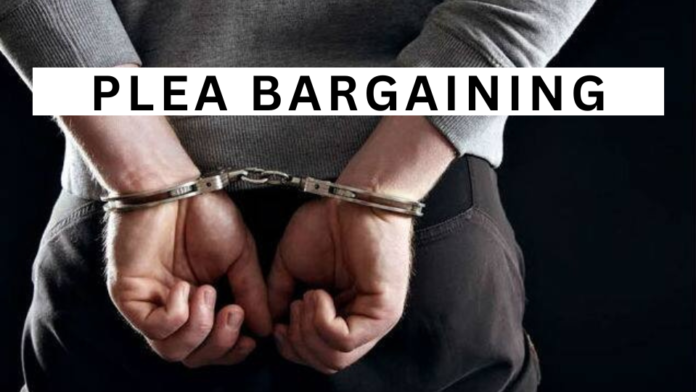Plea bargaining is not a traditional Indian legal idea. It is a recent development in the Indian criminal justice system. Plea bargaining is addressed under Sections 265A through 265L of Chapter XXIA of the Criminal Procedure Code. It was added to the Criminal Law Amendment Act of 2005.
Plea bargaining is the process by which the prosecution and defence reach an agreement in which the defendant pleads guilty to a lesser offence or one or more charges in exchange for a reduced sentence or the dismissal of additional charges. It is founded on the Nolo Contendere philosophy, which literally means “I do not wish to contend.” While not available for all types of offenses, plea bargaining has been used to reduce enforcement costs and free up court time to focus on more serious and pressing matters.The Law Commission’s 154th Report was the first to advocate “plea bargaining” in the Indian Criminal Justice System. Plea bargaining was defined as an alternate strategy that should be implemented to deal with the large backlog of criminal cases in Indian courts.
Types of Plea Bargaining
Charge Negotiation:
The term “charge bargaining” refers to the prosecutor’s pledge to lower or dismiss part of the charges filed against the defendant in exchange for a guilty plea. This is divided further into many charges and distinct charges.In the case of several counts, some are dismissed in exchange for a guilty plea to one of them. In a unique charge, a major charge is dismissed in return for a guilty plea to a less serious charge.
Fact Negotiation:
In fact, when a prosecutor bargains, he agrees not to challenge an accused’s account of the facts or expose aggravating factual circumstances to the court. There is an agreement for a selective presentation of facts in exchange for a guilty plea.
Specific Fact Negotiation:
In this type of negotiating, nolo contendere pleas are used to accept a sanction without pleading guilty. Another type of plea in this category is the Alford plea, in which the defendant accepts the sentence but maintains his innocence.
Punishment Bargaining:
“Penalty Bargaining” refers to the prosecutor’s pledge to propose a specific sentence or to refrain from recommending any sentence in exchange for a guilty plea. In sentence negotiation situations, trial judges typically choose to impose sentences that are no harsher than those proposed by prosecutors or to allow the accused to withdraw their guilty pleas.
Also Read: Supreme Court Collegium stands firm to appoint gay advocate Saurabh Kirpal as Judge in Delhi HC
The Concept of Plea Bargaining in Other Countries:
Plea bargaining was uncommon in early American history. When defendants volunteered to plead guilty, judges seemed astonished and attempted to urge them to go to trial instead. Plea bargains were becoming frequent in Boston as early as 1832, when public ordinance violators might expect less-severe sentences if they pleaded guilty. By 1850, the practise had spread to felony courts, and defendants were routinely pleading guilty in exchange for the removal of some charges or other bargains negotiated with the prosecutor.
In 1969, the United States Supreme Court overturned the conviction of a man who had received five death sentences after pleading guilty to five charges of robbery, claiming that the trial judge had failed to determine that the guilty pleas were voluntary (Boykin v. Alabama). Judges now question defendants in court to ensure that their guilty pleas are voluntary. The following year, the Supreme Court ruled that it is permissible to reward defendants who plead guilty with reduced penalties (Brady v. United States) and that defendants may plead guilty without admitting culpability, implying that they can plea bargain even if they believe they are factually innocent (Carolina v. Alford).
In a fourth plea bargaining decision, Santobello v. New York, the Supreme Court declared in 1971 that defendants are entitled to judicial recourse if prosecutors violate the terms of plea bargains. In Bordenkircher v. Hayes, the Court declared in 1978 that prosecutors may threaten to file further charges against accused persons who decline to bargain as long as those charges are lawful.
Also Read: Democracy without Independent Press is Lethal
Important Judgments
The Supreme Court stated in Kasambhai vs. State of Gujarat, Kachhia Patel, Shantilal Koderlal vs. State of Gujarat, and Anr that plea bargaining is against public policy. Furthermore, it lamented that the magistrate accepted the accused’s plea bargaining. Furthermore, the Supreme Court classified this approach as profoundly despicable conduct. The Court also ruled that the practise of plea bargaining is improper and unconstitutional because it encourages corruption and collusion and pollutes the pure fountain of justice.
The Court stated in Thippaswamy vs. State of Karnataka that persuading or leading an accused to plead guilty under a promise or assurance would be a violation of Article 21 of the Constitution. The Court also stated that “in such cases, the Court of Appeals or Revision should set aside the conviction and sentence of the accused and remand the case to the trial court so that the accused can, if he so wishes, defend himself against the charge and, if he is found guilty, a proper sentence can be passed against him.”
The Court recognised the relevance of plea bargaining in State of Gujarat vs. Natwar Harchandji Thakor, saying that every “plea of guilty” that is construed to be a part of the statutory procedure in a criminal prosecution should not be seen as a “plea bargaining” ipso facto. It is a question of fact that must be decided on a case-by-case basis. Given the changing nature of law and society, the court stated that the purpose of the law is to provide simple, inexpensive, and quick justice through resolving conflicts.






